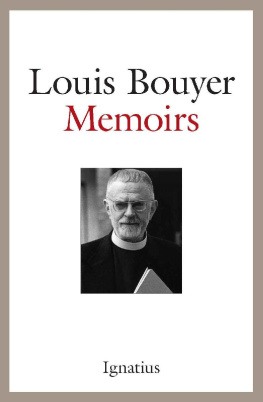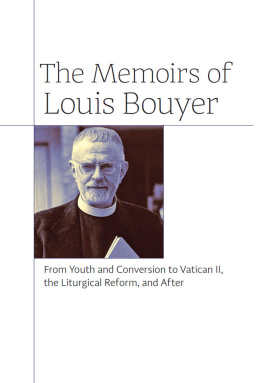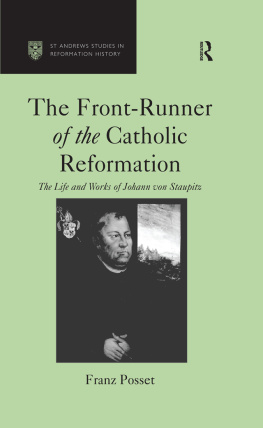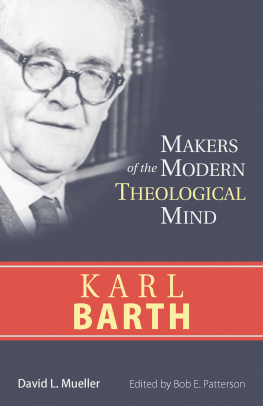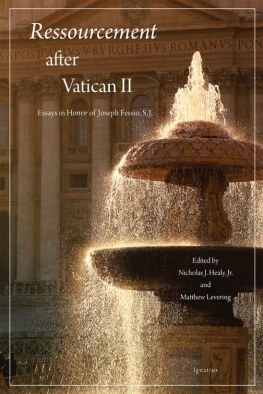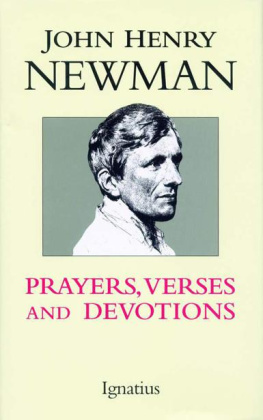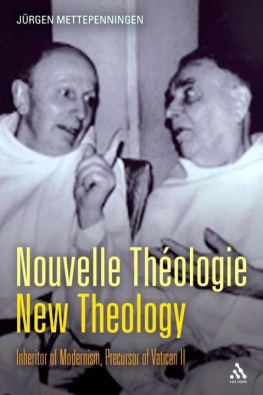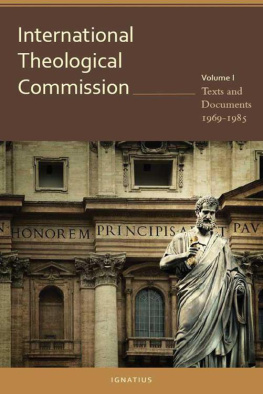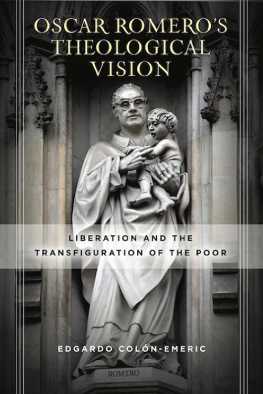Memoirs
Louis Bouyer
Memoirs

TRANSLATED AND ANNOTATED BY
ANNE ENGLUND NASH
IGNATIUS PRESS SAN FRANCISCO
Cover photograph of
Father Louis Bouyer, circa 1990s
Cover design by Roxanne Mei Lum
2015 by Ignatius Press, San Francisco
All rights reserved
ISBN 978-1-58617-695-2 (PB)
ISBN 978-1-68149-683-2 (E)
Library of Congress Control Number 2014912783
Printed in the United States of America
Note from the Publisher
We at Ignatius Press are blessed to have been among Father Louis Bouyers wide circle of friends. The very first book Ignatius Press published, in the spring of 1979, was his Woman in the Church , still in print because still a voice of wisdom in a confused world.
Before leaving us after one of his regular , he left us with the original French manuscript of his memoirs from which this translation has been made, with the hope that we would one day publish it. We are happy finally to have fulfilled his commission.
Fr. Joseph Fessio, S.J.
Founder and Editor
Ignatius Press
Contents
Introduction
Archbishop of Westminster, whose premature loss is one of my greatest regrets, entitled his memoirs Not the Whole Truth . With those very first words, he seems to me to have denounced the claim of so many memorialists, starting with Rousseau, to have said everything: as if that were possible, even if one sincerely wished to do so... which is probably never the case! But, as his example shows, undoubtedly the best a memorialist can do is offer a selection from among his memories of what, on reflection, seems capable of revealing something meaningful, for himself, first of all, and perhaps then for a few others.
The closer I come to the end, the more in fact I sense that there is a meaning in our life. The hand of God leads us to it, using all things for his purposes: failures, disillusionments, as well as and even more than successes, moments of happiness, or what seems to us to be such, and, what is most astounding, even our glaring faults!
So in the pages that follow, what I would like to recall is what, on final, or undoubtedly very nearly final, reflection, seems to me to have the most meaning. I hope that those who read them, and especially my friends, both known and unknown (for a writer, are not many of these latter often among the closest?), will also draw some profit from them, perhaps more than I do myself. I hasten to add that the entertainment that these pages could, at least I hope, provide them is an integral part in my eyes of that potential profit. For it is a too-little-known but to me unquestionable fact that Providence has a great and, of course, the best sense of humor! The terrible lack in this regard on the part of modern Christians in general (and of ecclesiastics in particular) is in my opinion what most prevents them from being taken seriously no matter what they say. I do not want to try to provoke them, but I will do nothing special to spare them.
May those of good faith, Christian or not, who read these pages sense that they are addressed to them by someone who had no other ambition in writing them but to merit being counted among them.
CHAPTER ONE
The Narrators Childhood
I was born the third child of parents already rather advanced in age, although my two older siblings were already dead, the first nearly at birth, the other at scarcely two years of age. And, what is more, I was born on the eve of that 1914 war which, by common opinion, marked the end of a civilization. After these introductory declarations, one might believe that my childhood was miserable, or at the very least unhappy. Nothing could be farther from the truth.
It must be a spring morning or at the beginning of summer. I may be around a year old, for I am taking my first steps. On the other side of the street, a lowered orange and white striped awning glistens in the sun. I am starting toward a chair placed in the same direction, where an orange, which is itself brilliantly colored, has been placed in order to entice me.
... According to what I have been told, it seems that my rapid progress was interrupted by a memorable fall, after which for a long time I no longer wished to make use of my legs, to the great distress of my family and of Irma, my little nurse. But it is quite revealing that I, for my part, have retained no memory of this misadventure at all, while the luminous awning and the attractive fruit have left an indelible memory of an entrance into a world of happy brightness in which shadows only enhance the light. I can say that all the trials of my life, and I have not been spared them, have never managed to erase that vision of awakening.
My mothers solicitous concern (reflected in an absolutely firm belief, which even a fair degree of annoyance was never to shake), Irmas kindness toward me (which, I am ashamed to say, I rewarded at least once by hurling a bowl of creamy milk at her faceI have always detested that, but she had been instructed to make me swallow it as is), my fathers goodness and dreamy idealism (which, in my judgment, was not in the least affected by the sound thrashing he felt obliged in conscience to administer to me that day): all that would have been enough to make those early years a paradise.
Obviously adding to that impression were the charm of that part of Paris, the proximity of my young aunt and godmother Jeanne, my mothers younger sister, of her husband, Uncle Francis (an expert in Far Eastern art who was, unconsciously I think, to leave an indelible mark on me), and of my cousin, their daughter Jacqueline, who was a little older than I. So much so that those early years seem to me to have passed like a single beautiful day like the one I have recalled.
I was thus scarcely more than a year old when we entered the war: the great war, as it would be called... before another one made it seem small-scale. A second one of my oldest memories must relate to its very beginning, for I see myself there on our balcony in the arms of my nurse. She, my mother, and I are watching my father get out of a taxi (still a rare thing) and shout to us: We are not leaving: no more trains! This could only have been one of the early days of August 1914.
But, apart from that, it seems to me that as long as we lived in that part of Paris (which, if I am not mistaken, was until 1916 or 1917), it remained a tranquil little world where life passed peacefully, and for us happily, in a beautiful setting shaded by tall trees, where the only excitement was serene and gay.
Beyond that, it was almost a completely country suburb, where a semi-rural disorder of mismatched buildings and little garden patches suffered from only a few noisy and smoky industrial blocks.
But along where we lived and my aunt lived, the place de Wagram, or along the boulevard Pereire, the two most urban noises made by the traffic of that time did no more than pleasantly punctuate the silence. One, I would say, filled it without dispelling it: it was that of horses trotting on the wooden pavement. A sound of which people have no idea today: a familiar and quiet music, with a bit of gaiety to it, which harmonized delightfully with the swaying coziness of the old carriages, where you were so well placed, on large grey or blue cushions, to watch from on high the swinging spectacle of houses, trees, and passersby. The other sound was a sign of a civilization that was barely on the way: the deafening racket, entertaining as long as it remained rare, of electric tramways creaking, whirling, and vibrating on their rails, with the joyful chimes of their bells, operated by the foot of the driver.
Next page
